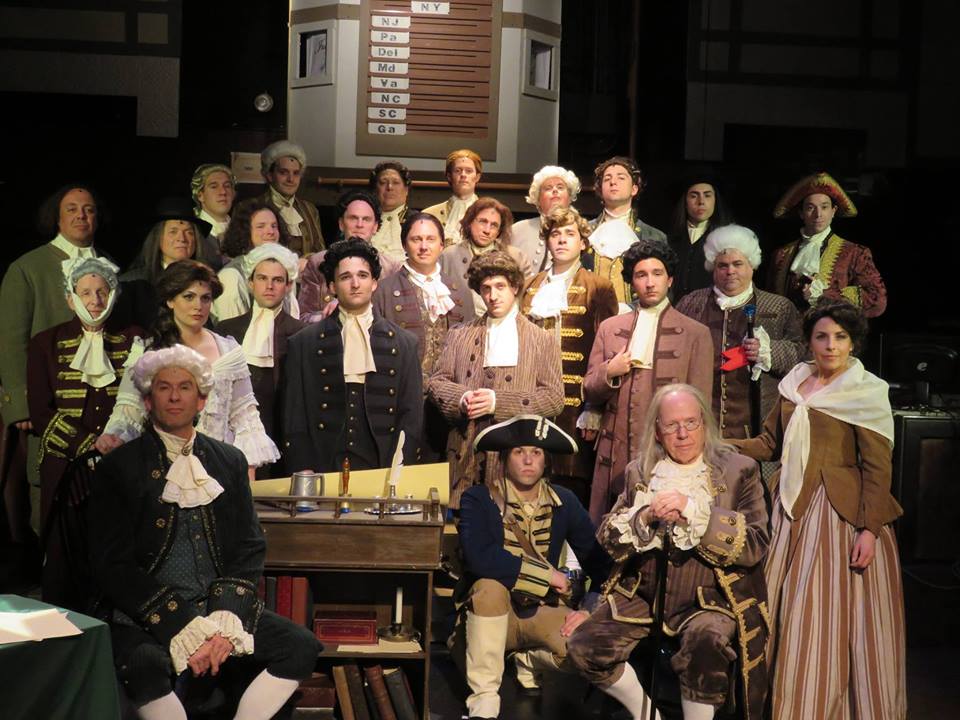Does one play the villain when one simply exposes the truth for what it is? The pungent aroma of hy-pocrisy wafting down from the north as John Adams campaigns for Independence in Philadelphia exposed by the surly tongue of Edward Rutledge in what is marked as one of the darkest musical numbers in 1776. Continuing on as the fourth installment of Vote Yes: Inside Independence Hall, TheatreBloom sits down with Dan Felton to discuss his antagonistic role inside the second continental congress.
Welcome back, Dan. It’s good to see you on stage again, it’s been quite a while since the readers have seen you. Mostly recently on stage in Les Miserables as Jean Valjean in the fall of 2013 at Toby’s and now back for 1776, right?
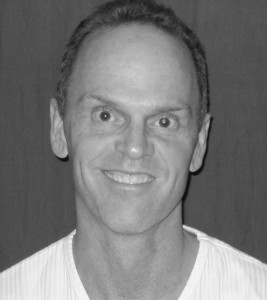
Dan Felton: Thank you, yes, I’ve come back. I’m playing Edward Rutledge and he’s the delegate from South Carolina.
Excellent. What was the appeal to want to be part of 1776?
Dan: When Toby had announced that she was doing the show I knew I wanted to be a part of it – if they would cast me. I’ve been in the show before. I did it at Ford’s Theatre as George Reed from Delaware. Not the most recent time that Ford’s did it, but about ten or eleven years ago. I was interested in doing it again.
It’s interesting that you played George Reed last time and are playing Edward Rutledge this time around. What’s the biggest difference between the two?
Dan: It’s funny they’re sort of on the same side. I mean I think Rutledge is obviously more assertive for one thing. And within the context of the show he’s not tied with anyone else in his delegation. Edward Rutledge is his entire delegation in the production, now obviously historically that’s not correct he was not the only one representing South Carolina. Whereas Reed is one third of the Delaware delegation with the other two on a different side of him. And you know, Reed never really changes his mind. He sticks with the same position throughout.
What is it that triggers Rutledge to finally switch sides if he starts off siding with George Reed and John Dickinson, but then, as history dictates, he votes yes?
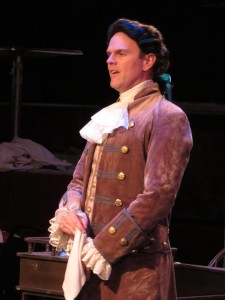
Dan: He gets what he wants. I don’t think he ever truly switches sides. Within the context of the play he’s for independence, he just has some sticking points. In reality historically he was much more on Dickinson’s side where he thought that reconciliation was possible so we didn’t need to go through this “exercise” of the declaration of independence. But within the reality of the play he’s portrayed to be much more for independence, so long as he can be sure that a couple things are preserved.
You are like a lot of the men in this show where you are known for your song and dance work on the stage. So what is it like taking on this, what is referred to as a show with music, from someone who is primarily a musical theatre person?
Dan: That’s part of the attractiveness of wanting to do it again. When I did it before I had a smaller part and I knew that this show has a lot of meaty book in it, that’s the challenge having so much meaty book. I was interested in a few different roles. It’s an actor’s exercise, you know the actor who sings well versus the singer who acts. I was interested in being able to bite into a role— now I get a song too, which is nice— but to have that opportunity to have a well written role that has a lot of acting meat and depth to it? I mean, there are a lot of really well written roles in this show, but to get a chance to do one of them, that was really an exciting prospect for me.
What was one of the biggest challenges that you grappled with in taking on this role?
Dan: I think it was his journey, trying to figure out where he’s going to start and where he’s going to end and not make him seem completely villainous in the process. He’s not a villain, an antagonist yes, but people look at him and see “bad.” For me, I want to find some humanity to him. I think that humanity in him is being involved with the others in congress so that we are supportive of other’s positions. Whether it reads at the end of the show that I’ve brought Rutledge around to a different view of different people in the show? I get what I want at the end of the day, however, we all get what we want at the end of the day as well. Well, most of us, everyone who ends up signing the declaration, anyway.
Do you want to talk about that accent?
Dan: That accent? Oh sure. I worked very hard on it to get it right. Jeremy (Director Jeremy Scott Blaustein) and Toby (Artistic Director Toby Orenstein) both said that they had to make sure if we were going to be doing a couple of accents in the show to help establish these characters that we did them with strong accuracy. If they were going to be key they needed to be right. It’s funny because a lot of people think about some of the accents we hear now, like Boston is often associated as sounding a certain way in modern day but that wasn’t necessarily how it sounded in 1776. There’s a lot of factors in play regarding the accents that are used in this show and I think those of us that do have them, mainly Richard Henry Lee (Jeremy Scott Blaustein), Hewes (Will Emory), McKean (David Bosley-Reynolds) and myself, and to a lesser extent John Adams (Jeffrey Shankle) we worked very hard to make them sound accurate to the way that they might have sounded back then. It’s really interesting because the script is clear with its suggestion that McKean in particular should have a strong accent, but in history McKean was second or third generation and by that point he probably wouldn’t have had an accent at all. I’m happy with the sounds we’ve created.
You did mention that you have a song, and since songs are rare in this musical, we are definitely going to talk about it, so tell us a little bit about it.
Dan: The song is about the slave trade, the triangle trade. At that time there were a couple different triangle trades in existence, but the one that I focus on is the one that involves New England as a participant. New England is a critical pivot point, or key cog in the machine, whatever you want to call it; they are vital in that particular trade which didn’t run from America to England but from Boston to Africa and Jamaica and back. They were an integral part of that trade which involved slaves. That’s showing the hypocrisy of New England as they sit there and say they’re not involved in the slave trade when in reality they’re supporting it fully because they’re providing the goods and the ships and the transportation of this triangle in which they are intimately involved.
What is the song like emotionally and vocally for you?
Dan: That’s a good question. Vocally it’s a hard song because there are two songs in the voice. There’s Rutledge’s voice and then there is the voice of him pretending or becoming this other voice. I mean this is all my perception of the song, but at the beginning and at the end you have Rutledge in his own voice and then in the middle he is the auctioneer at the auction. And you can really look at it two ways. Rutledge is either imitating the auctioneer or he sets the scene up so that he is the auctioneer, like he’s become possessed by it. He’s taking everybody away from Philadelphia to this other place to let them see the auction block. Vocally I’ve had to try to figure out how to distinguish one voice from the other so that you can hear the difference because I’m basically playing two different characters in one song. Even if it were just one character within the context of the song, it’s a very difficult song. I’ve seen people refer to it as an aria. I had never thought of that until I’d heard people refer to it that way. From that viewpoint, it was very difficult to approach. And I’ll be honest with you, I’m still trying to play with a few things, trying to figure out where to place certain things in that song in terms of the vocal aspect, which is different from the intent.
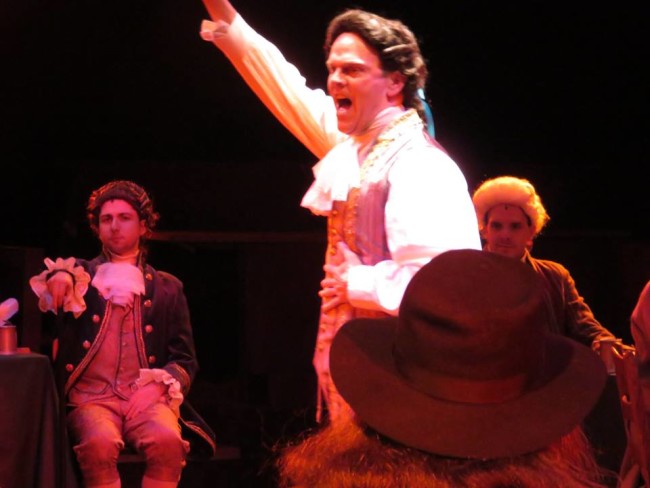
Emotionally the song is not difficult. The song aligns with Rutledge’s position in showing members of congress where he stands and what he stands for. It’s a political maneuver. I had a conversation with John Stevenson the other night (playing Ben Franklin) about political maneuvers, floor maneuvers and all that, it’s all a part of the process in moving things through a legislative body. This song is a maneuver. So from that viewpoint it’s not what people are seeing it as because emotionally it’s just a part of his plan to accomplish something. I don’t see it as— and this is going to sound like I’m not emotionally invested in the song but that’s not it at all— but from Rutledge’s viewpoint it’s an obvious maneuver. He has to be passionate and direct about it. From the character’s viewpoint he’s not a wreck or having a racing heartbeat, he’s just doing what he needs to do.
Now, performing the song isn’t making me a wreck, well, maybe it does a little bit. It’s hard to describe. I walk off the stage and my heart is beating really hard. That’s not normally what happens when I finish a song as an actor, so I know that there is something happening with this piece that is affecting me. Something is eliciting an emotional response in me from this song. And when I walk off stage I feel a little— I think dirty is a good word to use here. I feel a little dirty. I’ve just put these people in congress in an awful position and I’ve presented them with an awful reality. That part of me kind of feels a little dirty afterwards. From an actor’s viewpoint, that’s not always easy to do, but sometimes that’s what happens and you don’t even know it’s happening. It’s an emotional and physical response to what I’m doing and I think that means I’ve found the right emotional touch points that are not only soliciting a response from the people on stage but it’s also affecting me.
How are you and Rutledge similar and different? Don’t you sort of work in politics?
Dan: Sort of. I’m a lobbyist. So from that viewpoint I get very much where he is coming from. I’m not the legislator involved in that process but I am the lobbyist so I get the mechanics about the maneuvering and having strategies in place to convince people who aren’t on your side to be on your side for a particular issue. From the reality of what Rutledge is up against, I completely get that because I’ve been there— maybe not to the degree that he’s there— but it’s fun for me to be involved in that process. Emotionally I’d like to think that he considers himself superior to others and that comes across a little arrogant. He believes he’s the best at what he does whether it be the way he dresses, the way he speaks to people, the way he debates, he’s the best. Now all of that? That’s not me. Dan is, however, very focused, anal retentive, and all of those things. Those things align with Rutledge. We’re both very serious. Rutledge is— dour isn’t the right word— but he’s very serious through most of the show. You’re not going to see him laughing, rarely is he going to crack a smile. But when he does it will be a little smirk, once or twice where I’ll acknowledge that someone has said something funny in character, but otherwise it’s a smirk of cynicism, I smile because I got what I wanted.
What has doing this role taught you about yourself as a performer, or as an individual? Anything you might be taking out of the show and into real life with you?
Dan: I think with this show more so than a lot of show’s that I’ve done and maybe it’s just the mechanics of it because it’s in Toby’s space where it’s more intimate but it has really reminded me of how important it is to be engaged with others on stage. I’m really enjoying that part of the process. You give to people on stage and they give back. There’s a lot of that going on back and forth on this stage. So to be aware and to allow whatever is going to happen on stage on any given night; it’s easy to forget those things as an actor. You go into your mode and you do what you do and then it ends up being the same from night to night.
The perfect example was our swing, Danny Tippet, he went in last night for Dave Guy as Caesar Rodney. So Danny gets to the point where he leaves congress— because Caesar Rodney is ill and the cancer is taking over— he did a fabulous job, and it was very different than the way Dave Guy, who is also wonderful, plays it. Danny recognizes that there is quite an age difference between him and Dave so he didn’t try to play it older or anything like that. But he leaves congress and then I ask to call the vote because I recognize I’ve got Delaware in the bag, as the only one left is George Reed. But the way Danny played that moment— I responded to it differently. I loved that there was a moment for that differentiation. With this particular show you need to be extremely active with how responsive you are. That’s the perfect example of needing to be responsive of the people on stage. This particular show has been a real good reminder of that. Don’t go into your “hop on the train and do the show you ride every night” mode. There’s a lot of opportunity within this show to change it up a little bit so it’s fresh.
I mentioned this in the review and have talked to some of the cast about it, but there are points in the show where the audience starts to doubt the outcome.
Dan: Yeah, it’s crazy because we know the outcome. Even in the very last scene there are three or four different procedural things going on where you just aren’t sure. Even as an actor when I walk in for the final vote, I know whatever I do it doesn’t matter because Pennsylvania is going to vote nay. So if I want to hang on that slavery clause as Edward Rutledge it doesn’t matter. I could vote yea because of Pennsylvania. But when Pennsylvania says “come back to us” then all of the sudden it’s on me. I could be the only nay vote and that totally changes Edward Rutledge’s intent at that point because suddenly “wow, it’s on me.” And does he want to be remembered that way? So I have to decide if I’m going to push on the slavery clause or not. It’s fun because that’s the kinds of things that come up and you realize “oh, something has changed and now I have to respond to it.” Or rather, decide how I’m going to respond to it. That’s kind of deep.
If you had to be a founding father in history who would you be?
Dan: Honestly? From an actor’s viewpoint? You’re going to think this weird, but James Wilson. And it’s because I’m fascinated with that character in this show. I know, it sounds weird. But I’m fascinated with the fact that it comes down to his decision at the end of the day. From an actor’s viewpoint I think it’s very interesting. That opportunity to play a character that’s in the shadows through the whole show and then comes along and suddenly the game-changing, show-altering decision falls on his shoulders; that’s fascinating! There’s a lot of characters from an actor’s viewpoint that I’d like to play in this show but that one in particular, whether it’s historically accurate or not, I don’t know. But I really want to be him.
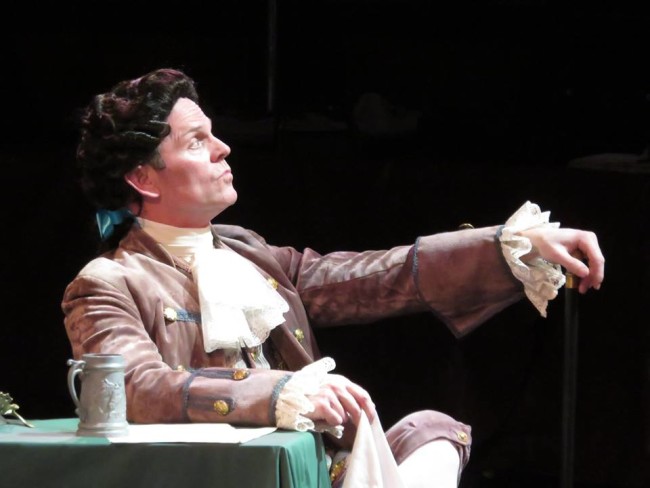
Now historically? Given the fact that I’m not age appropriate, if you can set that aside, probably Thomas Jefferson. He was a very interesting man, he was very talented, and very committed. I don’t know how much you know historically about Thomas Jefferson, and I don’t know a whole lot, but he worked very hard and he knew so much about so many different things. And he authored the Declaration of Independence. You know, he continued to obviously be a politician.
If the founding fathers were to be brought to Toby’s somehow to see this production of 1776 what do you think they’d have to say about it?
Dan: Well, besides the fact that some of it is not historically accurate, which is fine because you have to set things up for the purposes of the show, but otherwise I think they’d be proud of the people who wrote the show because they’ve done an incredible job with bringing to life something incredible in American history. I think from that point they’d be proud of the way they’re presented in that context. And in specific to the Toby’s production I suspect they would also be proud. You never know at Toby’s how a show is going to work in the round and whether a big glitzy production is what works best from an audience’s perspective or something more intimate. I think for Toby’s this show works brilliantly and they would agree because they space they were at in Philadelphia was probably quite similar in size and scope. It’s very intimate and you’re well within arm’s reach of everybody and I think they would find that very interesting that we’ve almost replicated what they had going on inside of congress not only with the show itself but just the unique staging that only Toby’s offers.
Why should people come to see 1776 at Toby’s?
Dan: I think it’s a good production, so there’s that. One should simply come see a show because it’s a good production. It’s still of value historically, and not only historically but in current times. You can hear the laughs from the audience, when the right audience is sitting in the seats and Jeffrey (Jeffrey Shankle playing John Adams) starts right off making slams at congress, it’s very true and relatable because that’s what’s going on in today’s day and age. It’s relevant. I guess that’s what I would say. I’m happy with the production, the way it turned out. You never know how a production is going to turn out until it opens. This is a good group of talented people who are really having fun with the show and doing great work.
What is it you are hoping people will take away from seeing 1776?
Dan: I hope they understand what really took place 200 plus years ago. How difficult it was. This was monumental for a bunch of colonies to have a bunch of events that lead up to them saying “we need to separate ourselves from what— at that time— was the greatest power in the world.” You see a lot of that happening in smaller stages all around the world right now and hopefully people will see this and realize that these things that are happening all around the world are incredibly amazing; for a nation to decide it’s going to become independent. It adds value to the democratic process. It can still happen today. It does still happen today. You look at what people are able to accomplish if they put their mind to something. I think that’s the real message to take away here. You can accomplish these kinds of things.
1776 plays through July 5, 2015 at Toby’s the Dinner Theatre of Columbia— 5900 Symphony Woods Road in Columbia, MD. For tickets please call (301) 596-6161 or purchase them online.
To read the review of 1776 click here.
To read Part 1 of Inside Independence Hall: An Interview with Co-Director Jeremy Scott Blaustein, click here.
To read Part 2 of Inside Independence Hall: An Interview with David James and Matthew Hirsh, click here.
To read Part 3 of Inside Independence Hall: An Interview with Russell Silber, click here.

